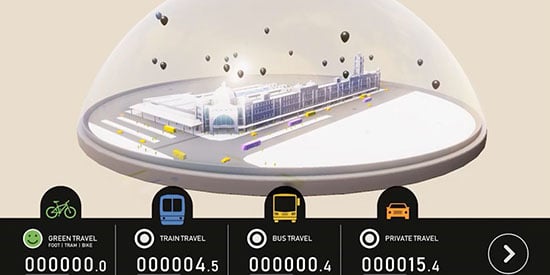New Fika AR tech lets you 'see' public transport emissions
Deakin news
If you could actually see the CO2 emissions your car produced, would you drive less and use your bike more? Probably. And this is exactly the thinking behind a new Deakin-led immersive reality technology that allows users to visualise the CO2 emissions produced by Melbourne’s transport systems.
Created by Fika Entertainment and researchers from Deakin University, together with the City of Melbourne (CoM), the project began in March 2020. Twelve months later the Fika/Deakin team are excited to see their hard work finally come to life as part of Melbourne Knowledge Week 2021 (26 April – 2 May).
Users access the immersive reality technology via an app which uses imagery and animation to represent complex data. Black balloons are used to represent C02 emissions, with different City of Melbourne and Flinders Street Station emissions and transport data visualised over time. Users can then explore how taking a tram or driving impacts those numbers.
Dr Greg Bowtell, the lead Deakin researcher, is a lecturer in games and virtual reality in the School of Information Technology.
‘A Tonne of C02 is a small, prototype experience, designed to explore how complex emissions data related to transport can be translated into a user-friendly, augmented reality (AR) experience.’ explains Dr Bowtell.
‘Immersive reality technology has great potential when you are trying to communicate complex ideas. Allowing people to ‘see’ local emissions is important, as it can be difficult to relate to such a large-scale global issue.
‘Delivering this experience via AR provides a wonderful novelty to get people excited to explore the experience. It allows us to show the City of Melbourne floating in space as though it’s in a giant snow globe, showing people in simple terms how the choices they make ‘trap’ emission in the atmosphere.’
Dr Jordan Beth Vincent is the Executive Management and Head of Sales and Strategy at Fika Entertainment.
‘It’s terrific to be part of this collaboration, and to work with an interdisciplinary team at Deakin and with the City of Melbourne through an iterative and creative process,’ says Dr Vincent.
‘The project was rewarding for both Deakin researchers and for Fika Entertainment.
‘One of the biggest challenges was dealing with COVID, and the pushed timelines and delays that it brought. However, now that Melbourne Knowledge Week is back, we’re really excited to be able to start gathering research data about the experience and for the general public to start interacting with it.’
The next stage of the project will be to gather research about the effectiveness of AR for communicating climate change data at Melbourne Knowledge Week. This will provide valuable data into Deakin’s larger research interest in climate change communication.
Visit the exhibition as part of Melbourne Knowledge Week 2021.
Share this story

